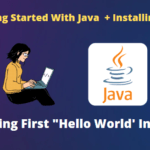In current times the demand for Java developers has increased and Java has become the most widely used programming language. In this post, we’ll explore OOPS Concepts In Java. Java is popular because of its support for Object-Oriented Programming (OOP) Concepts. While OOP might sound like a complex term, it’s basically a way of organizing code that helps make programs more manageable and maintainable.
Also Read: What is System Design? An Introduction to System Design
Table of Contents
Objects and Classes
At the base of OOP In Java are Objects and Classes. An Object is a real-world entity, while a class is a blueprint for creating objects. Just think of a class as a recipe, and an object as the dish prepared following that recipe. For example, if we have a “Car” class, we can create multiple “Car” objects, each with its own unique characteristics.
class Car {
String make;
String model;
int year;
}Encapsulation
Encapsulation is about building data (variables) and the methods (functions) that operate on that into a single unit called a class. This keeps data safe from unauthorized access and modification. In Java, we use access modifiers like private , public, and protected to control access to class members.
class BankAccount {
private double balance;
public void deposit(double amount) {
if (amount > 0) {
balance += amount;
}
}
public double getBalance() {
return balance;
}
}Inheritance
Inheritance allows a class to inherit properties and methods from another class. It promotes code code reuse and establishes a hierarchical relationship between classes. The child class (subclass) inherits attributes and behaviors from the parent class (superclass).
class Animal {
void eat() {
System.out.println("This animal eats food.");
}
}
class Dog extends Animal {
void bark() {
System.out.println("The dog barks.");
}
}Polymorphism
Polymorphism is the ability of different objects to respond to the same method or message in different ways. In Java, polymorphism is achieved through method overriding and interfaces.
interface Shape {
void draw();
}
class Circle implements Shape {
@Override
public void draw() {
System.out.println("Drawing a circle.");
}
}
class Square implements Shape {
@Override
public void draw() {
System.out.println("Drawing a square.");
}
}Abstraction
Abstraction is the process of simplifying complex systems by breaking them down into smaller, more manageable parts. In Java, abstract classes and interfaces are used to define abstract types that provide a blueprint for other classes.
abstract class Shape {
abstract double area();
}
class Circle extends Shape {
double radius;
@Override
double area() {
return Math.PI * radius * radius;
}
}Conclusion
In this post, we explore various fundamental topics of Object-Oriented Programming OOPS Concepts In Java, focusing on objects, classes, encapsulation, inheritance, polymorphism, and abstraction. These Concepts together support OOPS and provide a structured approach to designing and organizing code, making it easier to build and maintain complex software systems. Learning these concepts and applying these principles will help you write more efficient and maintainable Java code.
- I Tried ChromeOS Flex After Switching From Windows 10 - October 13, 2025
- Top 5 Business Skills Every Programmer Needs to Get Hired (2025 Guide) - August 27, 2025
- Intel’s Downfall? How a Silicon Titan Lost the Plot—and What Comes Next - August 26, 2025








Pingback: Coding vs Programming: Understanding the Difference - Mr Programmer
Pingback: How to Become a Java Developer - Mr Programmer